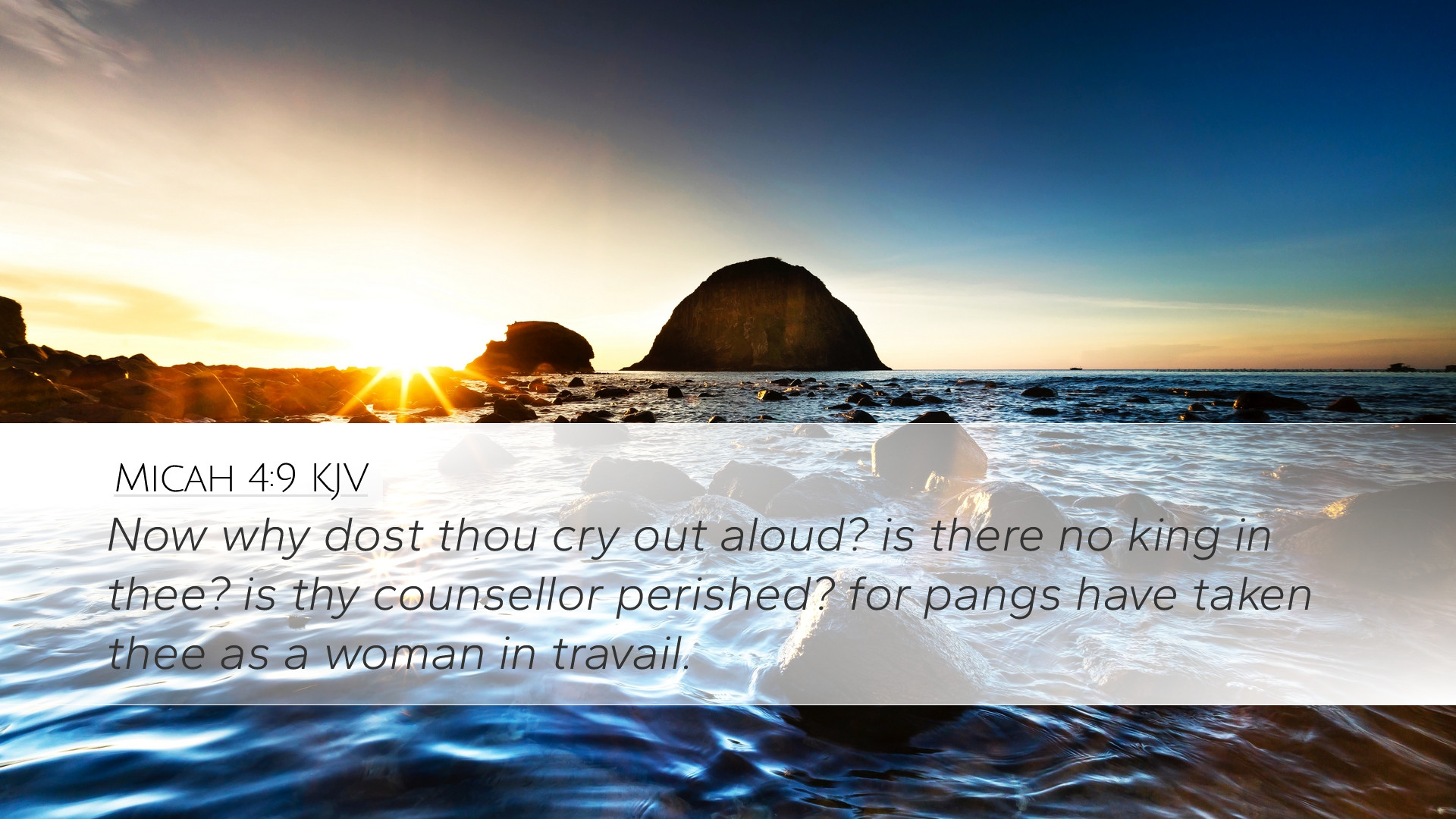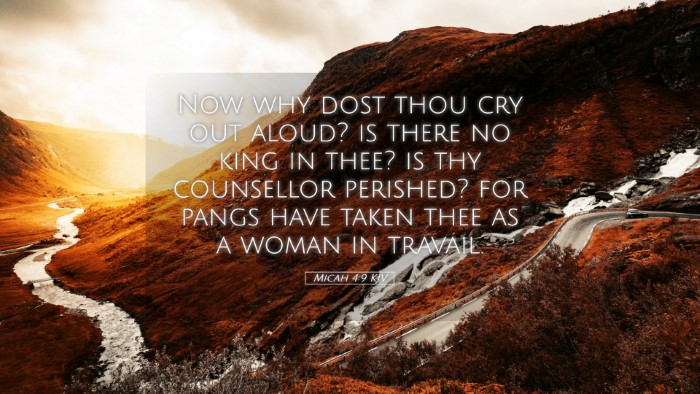Old Testament
Genesis Exodus Leviticus Numbers Deuteronomy Joshua Judges Ruth 1 Samuel 2 Samuel 1 Kings 2 Kings 1 Chronicles 2 Chronicles Ezra Nehemiah Esther Job Psalms Proverbs Ecclesiastes Song of Solomon Isaiah Jeremiah Lamentations Ezekiel Daniel Hosea Joel Amos Obadiah Jonah Micah Nahum Habakkuk Zephaniah Haggai Zechariah MalachiMicah 4:9
Micah 4:9 KJV
Now why dost thou cry out aloud? is there no king in thee? is thy counsellor perished? for pangs have taken thee as a woman in travail.
Micah 4:9 Bible Commentary
Commentary on Micah 4:9
Verse: "Now why dost thou cry out aloud? is there no king in thee? is thy counsel perished? for pangs have taken thee as a woman in travail." (Micah 4:9, KJV)
Introduction
The prophet Micah addresses Jerusalem in a time of distress. This verse serves as a poignant reminder of the dire circumstances faced by the people of God, underscoring themes of leadership, hope, and the inevitable challenges of life. The verse speaks both to the grief of the people and the prophetic challenge to consider their situation in light of God’s sovereignty and promise.
Contextual Background
To appreciate Micah 4:9 fully, one must consider the historical and cultural context of ancient Israel. Micah prophesied during a period when the Northern Kingdom of Israel was on the brink of destruction due to its pervasive sin and idolatry. The Southern Kingdom, Judah, though seemingly more faithful, faced threats from external enemies and internal corruption. Micah’s message blends judgment with hope, emphasizing that God’s restoration is achievable even in the midst of despair.
Exegesis of the Verse
In this passage, the prophet Micah employs vivid imagery to communicate the pain and sorrow of the people. The cry out of Jerusalem is a symbol of both individual and collective anguish. The rhetorical questions posed in the verse prompt self-reflection on the state of the nation: “is there no king in thee?” suggests a profound crisis of leadership.
1. The Cry of Distress
Micah begins with a poignant question, “Now why dost thou cry out aloud?” suggesting a desperate plea for help. The people of Jerusalem are depicted as lost and bewildered, crying out for deliverance. This cry reflects a deep spiritual and emotional turmoil as they grapple with their circumstances.
2. Questioning Leadership
The mention of a king implies governance and authority. Matthew Henry posits that the absence of a king signifies not only political turmoil but also a spiritual deficiency. The cry indicates that the people feel abandoned, lacking guidance during this critical juncture. The question “is thy counsel perished?” emphasizes the idea that wise counsel, essential for recovery and protection, has seemingly vanished.
Significance of Leadership
Albert Barnes highlights that Micah’s question points to the need for righteous leadership. Without godly leaders, societies spiral into chaos. Leaders are meant to provide direction, comfort, and a sense of security—attributes the people believe they currently lack.
3. The Imagery of Pangs
The verse concludes with the powerful metaphor, “for pangs have taken thee as a woman in travail.” This imagery evokes feelings of pain, helplessness, and the struggle that precedes new life. Adam Clarke emphasizes that the pains signify an impending birth, hinting at the hope of restoration to come despite the suffering endured. The metaphor speaks to the transformative nature of suffering, suggesting that through trials, new beginnings may emerge.
Theological Implications
Micah 4:9 provokes profound theological reflection. It raises questions about God’s presence amid suffering and the role of human leadership in discerning God’s will. The verse encapsulates a tension between despair and hope, inviting the faithful to consider how God operates in the world and in their individual lives.
1. God’s Sovereignty
Despite the grief expressed, one cannot overlook God’s sovereignty. Even in dire situations, God’s purposes are often at work, drawing His people back to Himself. The rhetorical questions suggest that God is still present, guiding the future of His people.
2. The Role of Human Responsibility
The absence of a king and wise counsel signifies human responsibility in spiritual and moral decay. Leaders and individuals alike carry the weight of their choices, which can lead to national crisis or renewal. The call to reflect is a reminder for both leaders and laypeople to seek God’s guidance and wisdom.
3. Birth through Suffering
The metaphor of travail signifies a promise of new birth. As Clarke notes, pain is often a precursor to significant spiritual breakthroughs. This duality of suffering and renewal is a profound truth within the human experience, echoing the gospel message of death leading to resurrection.
Conclusion
Micah 4:9 offers a rich tapestry of insights for pastors, students, theologians, and scholars. It urges reflection on the cry for help amid leadership crises, the necessity of wise counsel, and the transformative power of suffering. As we delve deeper into this text, it becomes evident that the core message remains relevant: even in despair, God is at work, leading us toward hope and restoration.
Reflection Questions
- What does this passage reveal about the nature of God in times of distress?
- How can church leaders learn from Micah’s lament over Jerusalem?
- In what areas of your life do you feel the pangs of travail leading to new possibilities?


